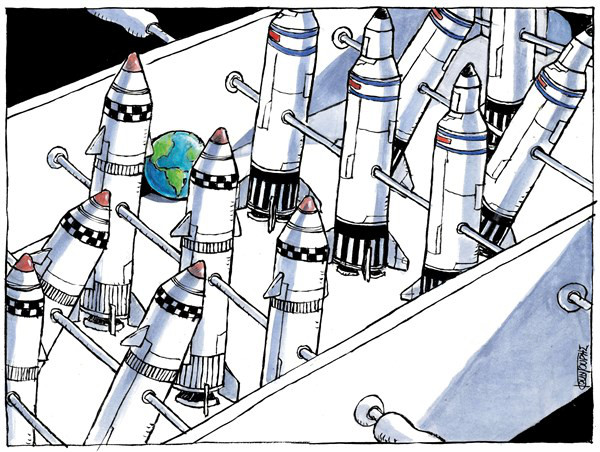Only Congress Can Declare War
Do Cold War Relics Lead to a Hot War Today?

Can President Trump take us to war in North Korea? That is the existential question. He is commander in chief and he has custody of the nuclear codes. Despite the constitutional provision that only Congress can declare war, what can President Trump actually do?
First, the nuclear codes. A consequence of the long cold war, with both bitter adversaries in possession of large arsenals of nuclear weapons, it was recognized that the time to act in case of an ICBM attack was very limited. Assembling Congress to debate and pass a resolution to declare war was impossible. If this nation were to act in response to a nuclear attack, there are only a few minutes to do so before the nuclear bombs would start to rain down. It was decided to develop an elaborate decision process to provide a check on any errors in information, but ultimately faith had to be placed in a single individual to order the response; that individual is the President of the United States. Missiles will be launched on his order via the nuclear codes; it cannot be countermanded.
However, the nuclear codes and the decision process surrounding them were all worked out in the context of a response to a nuclear attack by an adversary. To exercise the codes without such a context constitutes a “first use of nuclear weapons,” something the citizens of this country have long understood we will never do. We did it in World War II, and in the aftermath we vowed never to do that again. And if we should choose to do a “first use,” there is no constraining time element; we have time to have Congress to debate and decide if this is the thing to do. So there is no rationale to support a president’s unfettered exercise of the nuclear codes in a “first use” scenario.
But the system is not perfect, and errors can happen. The early warning information that a launch has been detected and that it is headed for the United States can be in error, which has happened before but fortunately was corrected before any action was taken. A great deal depends on the robustness of our early warning and detection systems and the checks built into our decision system that underlie the use of the nuclear codes.
But what do we do in the case that we are not under attack but our intelligence indicates that at some unspecified time, days, months, years, we may be. Should a peremptory strike on our part be considered? And should it be a nuclear strike, a clear case of first use which we vowed never again, or a conventional one? And what about the reliability of our intelligence? We went to war in Iraq based primarily on the case that had been made from our intelligence. That didn’t work out too well, even though Congress had been somewhat consulted in an Authorization to use Military Force, which is far short of a formal declaration of war against a nation state.
North Korea is a sovereign nation, and despite its bellicose and threatening rhetoric we must treat it as such. Our president has joined in an escalating war of words with the North Korean president, Kim Jong-un, and from his demeanor and the tenor of his rhetoric, one gets the strong feeling that he believes he can take this country to war against North Korea just on his decision. He has custody of the nuclear codes that require only his command to initiate a nuclear strike. But is that all there is to it? The nuclear codes were never envisioned to allow the president to initiate a first use of nuclear weapons. Congress must be consulted as the Constitution requires. There is time for debate.
What if the president wants to initiate a conventional war, such as an invasion of North Korea, under the War Powers Act? The War Powers Act was enacted to provide the president as commander in chief with the ability to respond in a timely manner against hostilities directed against the United States, primarily attacks by stateless terrorists. The 9/11 attack is a good example, whereby we invaded parts of Afghanistan in taking on Al Qaeda. Even then we did not declare war on Afghanistan nor are we at war with that nation today. If we initiate an invasion by conventional forces against North Korea, that is something quite different than the circumstances envisioned by the War Powers Act.
If the president wants to initiate a conventional war against North Korea, there is a perfectly good remedy in the Constitution; ask Congress to declare war. The Constitution provides only Congress with the power to declare war. When the Constitution was framed, war was always thought of as combat between nation states. Now with nuclear weapons and stateless terror, things are far more complicated, but in the case of North Korea the Constitutional provisions seem quite applicable. Let’s not allow this president to take us into war just because he believes he can do so as commander in chief.



